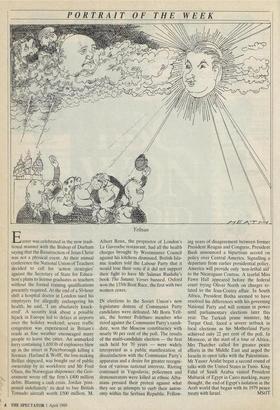PORTRAIT OF THE WEEK
Yeltsun Easter was celebrated in the now tradi- tional manner with the Bishop of Durham saying that the Resurrection of Jesus Christ was not a physical. event. At their annual conference the National Union of Teachers decided to call for 'action strategies' against the Secretary of State for Educa- tion's plans to license graduates as teachers without the formal training qualifications presently required. At the end of a 50-hour shift a hospital doctor in London sued his employers for allegedly endangering his health; he said, 'I am absolutely knack- ered'. A security leak about a possible hijack in Europe led to delays at airports over the holiday weekend; severe traffic congestion was experienced in Britain's roads as fine weather encouraged many people to leave the cities. An unmarked lorry containing 1,650 lb of explosives blew up in the street in Peterborough killing a fireman. Harland & Wolff, the loss-making Belfast shipyard, was bought out of public ownership by its workforce and Mr Fred Olsen, the Norwegian shipowner; the Gov- ernment wrote off the firm's £400 million debts. Blaming a cash crisis, Jordan 'post- poned indefinitely' its deal to buy British Tornado aircraft worth £500 million. M. Albert Roux, the proprietor of London's Le Gavroche restaurant, had all the health charges brought by Westminster Council against his kitchens dismissed. British Isla- mic leaders told the Labour Party that it would lose their vote, if it did not support their fight to have Mr Salman Rushdie's book The Satanic Verses banned. Oxford won the 135th Boat Race, the first with two women coxes.
IN elections to the Soviet Union's new legislature dozens of Communist Party candidates were defeated. Mr Boris Yelt- sin, the former Politburo member who stood against the Communist Party's candi- date, won the Moscow constituency with nearly 90 per cent of the poll. The results of the multi-candidate election — the first such held for 70 years — were widely interpreted as a public manifestation of dissatisfaction with the Communist Party's apparatus and a desire for greater recogni- tion of various national interests. Rioting continued in Yugoslavia; policemen and demonstrators were killed as ethnic Alba- nians pressed their protest against what they see as attempts to curb their auton- omy within the Serbian Republic. Follow- ing years of disagreement between former President Reagan and Congress, President Bush announced a bipartisan accord on policy over Central America. Signalling a departure from earlier presidential policy, America will provide only 'non-lethal aid' to the Nicaraguan Contras. A tearful Miss Fawn Hall appeared before the federal court trying Oliver North on charges re- lated to the Iran-Contra affair. In South Africa, President Botha seemed to have resolved his differences with his governing National Party and will remain in power until parliamentary elections later this year. The Turkish prime minister, Mr Turgut Ozal, faced a severe setback in local elections as his Motherland Party achieved only 22 per cent of the poll. In Morocco, at the start of a tour of Africa, Mrs Thatcher called for greater peace efforts in the Middle East and urged the Israelis to open talks with the Palestinians. Mr Yasser Arafat began a second round of talks with the United States in Tunis. King Fand of Saudi Arabia visited President Mubarak of Egypt in Cairo marking, many thought, the end of Egypt's isolation in the Arab world that began with its 1979 peace


















































 Previous page
Previous page